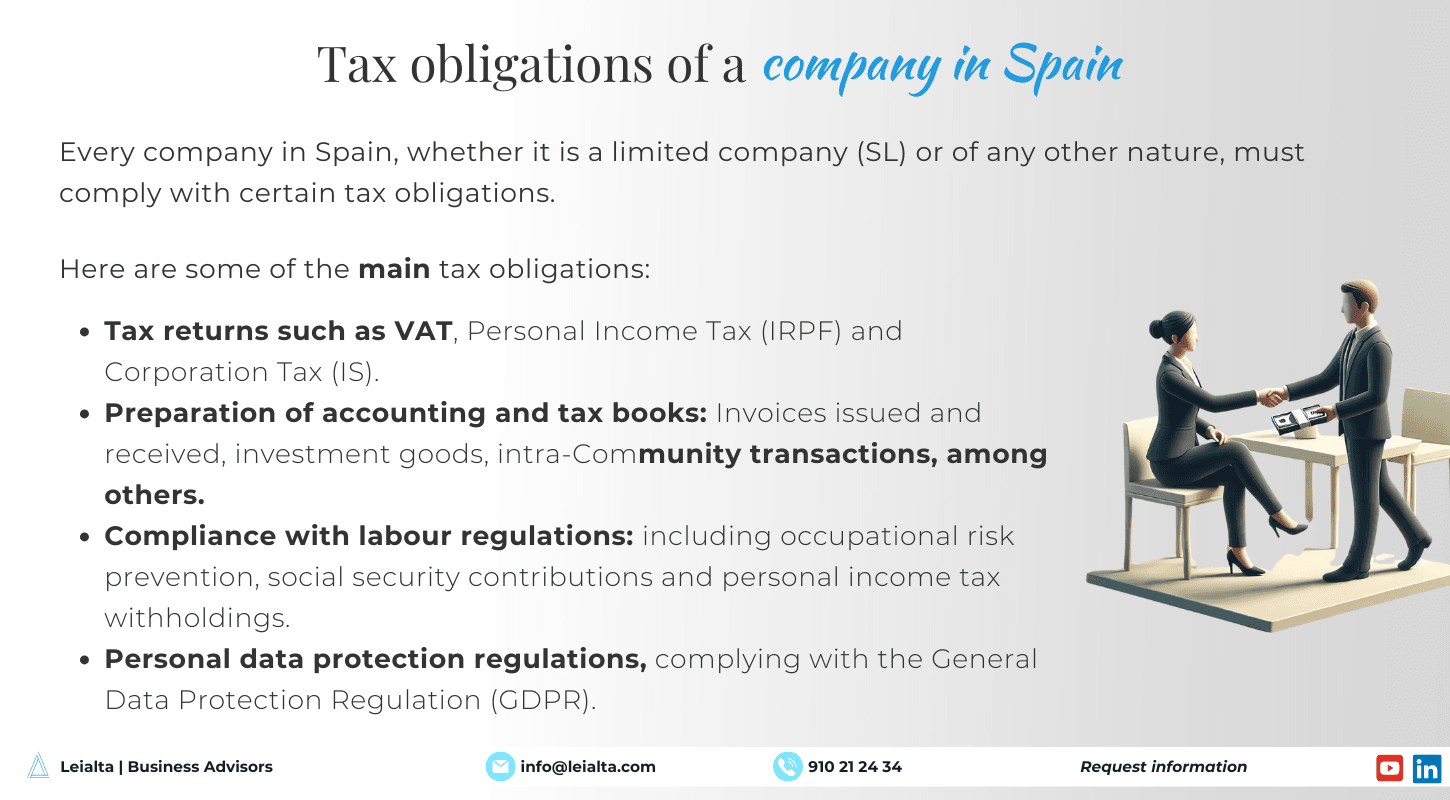
Creating and managing a company in Spain not only involves focusing on its growth, but also complying with a series of essential tax obligations to avoid penalties from the Tax Agency. In this post, we tell you about the tax forms that a company must file, the deadlines for each of them, and the consequences of not complying with these requirements in due time and form. You will also find a video with a detailed explanation of the main tax obligations for companies in Spain.
💡 Note: This content has been updated in 2024, according to current tax regulations.
Tax obligations of a company in Spain
Index of contents
Every company in Spain, whether it is a limited company (SL) or of any other nature, must comply with certain tax obligations. These obligations include, among other things, the filing of tax forms, the preparation of accounting and tax books, compliance with labour regulations and the application of data protection regulations.
Here are some of the main tax obligations for companies in Spain:
- Tax declaration: Among the most relevant taxes are VAT, Personal Income Tax (IRPF) and Corporate Income Tax (IS).
- Preparation of accounting and tax books: Invoices issued and received, investment goods, intra-Community transactions, among others.
- Compliance with labour regulations: This includes occupational risk prevention, Social Security contributions and income tax withholdings.
- Personal data protection regulations: All companies must comply with the General Data Protection Regulation (GDPR).
Tax forms for companies
The Tax Agency requires the filing of several tax forms. These are divided into quarterly and annual forms, and may be intended to pay taxes (such as VAT or personal income tax) or for information purposes (such as Form 347 for transactions with third parties).
Quarterly forms:
- Form 111 (Personal Income Tax Withholdings): Declares withholdings on payroll and invoices to professionals. It is filed in January, April, July and October.
- Form 115 (Withholdings for rentals): To declare withholdings on the rental of premises or offices. It is filed quarterly.
- Form 303 (VAT): Reports on output and input VAT. It is filed monthly for large companies and quarterly for the rest.
- Form 202 (Payment in instalments for Corporate Income Tax): Advance payment of Corporate Income Tax. It is filed in April, October and December.
Annual forms:
- Form 190 (Annual Personal Income Tax Summary): Summary of withholdings declared in Form 111.
- Form 180 (Annual rental summary): Information return on withholdings on rentals.
- Form 390 (Annual VAT summary): Annual VAT summary, complementary to Form 303.
- Form 347 (Transactions with third parties): Return of transactions in excess of €3,005.06 with the same customer or supplier.
- Form 349 (Intra-Community transactions): For companies that carry out transactions within the EU. It can be monthly, quarterly or annual, depending on the volume of transactions.
- Form 200 (Corporate Income Tax): Annual corporate income tax return. It is filed between 1 and 25 July if the tax year coincides with the calendar year.
📊 Related video from our Youtube channel: Tax obligations of a company, what are they?
🔗 To find out more about VAT reporting, please see our article on what VAT is and the deadlines for reporting it.
Consequences of not filing tax forms on time
Failure to file tax forms on time or after the deadline may result in penalties and surcharges from the tax authorities. Here are the main consequences depending on the type of regularisation:
- Voluntary regularisation: If you regularise the situation before receiving a request from the Inland Revenue, a surcharge for untimeliness will be applied:
- 5% if you present within the first 3 months.
- 10% between 3 and 6 months.
- 15% between 6 and 12 months.
- 20% after 12 months.
- If the Tax authorities detects the offence and summons you, late payment interest and a penalty will be applied, which can range from 50% to 150% of the amount not paid, depending on whether the offence is minor, serious or very serious.
In some cases, such as when the declaration is negative (i.e. no obligation to pay), a fixed penalty of €200 will be applied.
How a tax consultancy in Spain can help you
To avoid tax filing errors and comply with all tax obligations, having a tax consultancy is key. At Leialta, we offer you a specialised service in tax planning and personalised advice. Our team can help you:
- Filing tax forms correctly and on time.
- Reduce the tax burden through proper planning.
- Avoid tax inspections and penalties.
In addition, our service is aimed at resolving your doubts in less than 12 hours and in English, in case you are a foreign client.
Complying with your company’s tax obligations is not only essential to avoid penalties, but also to optimise your tax management and improve the financial health of your business. If you have any doubts or need support in this process, at Leialta we are at your disposal to help you close the tax year and plan for 2025 with peace of mind.
🔗 Do you want to know more? Consult our tax consultancy services for businesses and let our specialists guide you.



